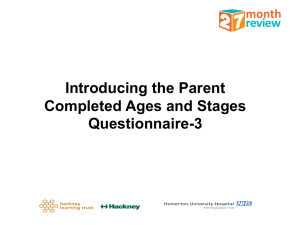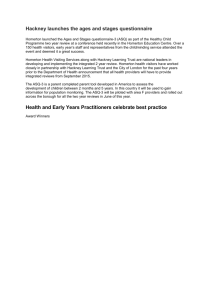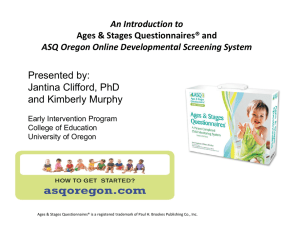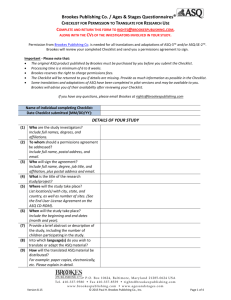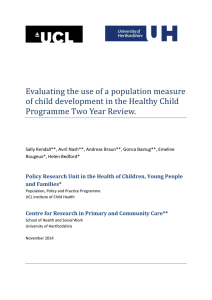ASQ-3
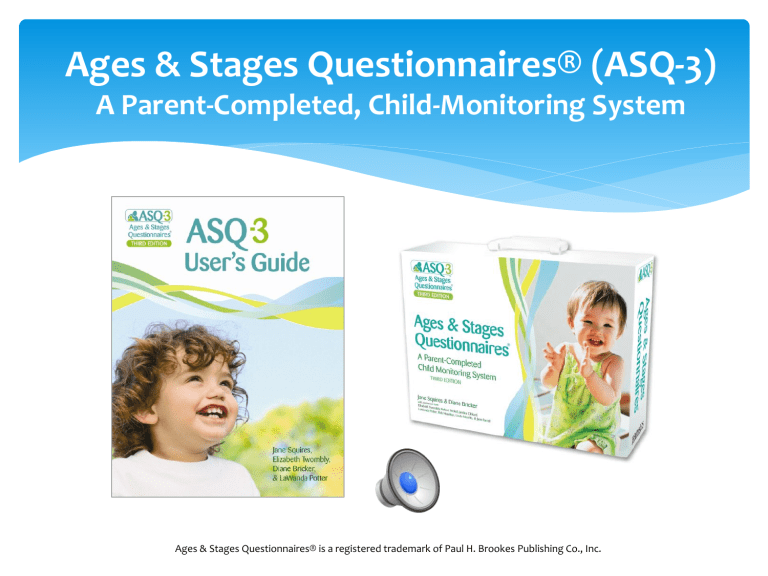
Ages & Stages Questionnaires® (ASQ-3)
A Parent-Completed, Child-Monitoring System
Ages & Stages Questionnaires® is a registered trademark of Paul H. Brookes Publishing Co., Inc.
Training Objectives
Define and discuss the benefits of developmental screening
Describe features of the ASQ-3
Score the ASQ-3
Describe ASQ-3 cutoff scores
Interpret ASQ-3 information in relation to other referral considerations
ASQ and ASQ:SE Training Materials by Jane Squires, Jane Farrell, Jantina Clifford, Suzanne Yockelson, and Elizabeth Twombly
Copyright © 2008 by Paul H. Brookes Publishing Co. All rights reserved.
For more information about the ASQ and ASQ:SE, see http://www.agesandstages.com
What is the ASQ-3?
Parent- or caregiver-completed screening tool that encourage parental/caregiver involvement
Series of questionnaires for children ages 1 months to 5 ½ years
Tool to accurately identify children at risk for developmental delay
ASQ and ASQ:SE Training Materials by Jane Squires, Jane Farrell, Jantina Clifford, Suzanne Yockelson, and Elizabeth Twombly
Copyright © 2008 by Paul H. Brookes Publishing Co. All rights reserved.
For more information about the ASQ and ASQ:SE, see http://www.agesandstages.com
Domains Screened by the ASQ-3
ASQ-3 (screens 5 domains):
Communication
Gross motor
Fine motor
Problem solving
Personal-social
ASQ and ASQ:SE Training Materials by Jane Squires, Jane Farrell, Jantina Clifford, Suzanne Yockelson, and Elizabeth Twombly
Copyright © 2008 by Paul H. Brookes Publishing Co. All rights reserved.
For more information about the ASQ and ASQ:SE, see http://www.agesandstages.com
Features of the
Ages and Stages
Questionnaires
(ASQ-3)
Features: ASQ-3 Intervals
21 Questionnaire intervals:
2, 4, 6, 8, 9, 10, 12, 14, 16, 18, 20, 22, 24
27, 30, 33, 36 (spaced 3 months apart)
42, 48, 54, 60 (spaced 6 months apart)
ASQ-3 Intervals
9 month vs. 10 month forms
9 month developed for pediatricians to use at 9 month check-up.
When screening 9 month old child use 10 month
ASQ-3 as it is more stringent.
Features: ASQ-3 Cover Page
•Administration window indicated on ASQ-3 cover page.
•16 month “ window ” is 15 months, 0 days to 16 months, 30 days.
Features: ASQ-3 Cover Page
Gathers information to choose correct ASQ-3 Interval.
Date ASQ Completed
Childs Date of Birth
Prematurity question (up to 24 months)
Calculate Age at administration or Adjusted age and compare with administration window.
Features: ASQ-3 Areas & Questions
5 developmental areas (e.g., Communication)
6 questions in each area
Questions are in hierarchical order
Questions #5 and #6 are average skills for children of that age interval
(i.e., a 12 month skill for a 12 month child).
Response options: Yes, Sometimes, Not Yet
Written at 4th to 5th grade reading level
Features: ASQ-3 Overall Section
Un-Scored Section
Looks at quality of skills (e.g., speech)
Example: “ Does your baby use both hand equally well?
”
“ No ” response indicates possible medical diagnosis. Important to follow up.
Parent concerns very predictive.
Any concerns or questionable responses require follow-up
Features: ASQ-3 Summary Sheet
Each ASQ-3 interval has unique summary sheets.
Summary sheets have five sections:
Child/family information
Bar graph with cutoffs
Overall section
Follow-up action taken (new to ASQ-3)
Optional section: Individual item responses
How to
Administer ASQ-3
Prescreening Activities
Obtain consent.
Explain purpose of screening and review questionnaire content.
Schedule screening.
Select Correct ASQ-3 Interval.
If possible, provide parent with ASQ-3 prior to administration.
Assemble materials (if necessary).
ASQ-3
Administration:
Andrew Scoring
Exercise
Andrew: ASQ-3 Cover Page
Date ASQ Completed: October 14, 2008.
Child’s Name: Andrew
Child’s Date of Birth: April 30, 2007
Vicky (mother) filling out questionnaire.
What is Andrew ’ s actual Age at ASQ
Administration in months and days?
Age at Administration: Andrew
Date ASQ Completed: October 14, 2008.
Child’s Date of Birth: April 30, 2007
=
2008 10 (9)
2007 4 mo
1 year 5 mo
14 (+30) days
30 days
14 days
Andrew ’ s Age at administration is 17 months 14 days
Choosing the correct ASQ-3 when the child is premature.
Adjusted age:
Subtract weeks of prematurity from child’s age at administration to create an adjusted age.
Use adjusted age to choose appropriate
ASQ-3 interval.
Adjusted Age: Andrew
Andrew was born 6 weeks premature.
What is Andrew ’ s Adjusted Age?
17 months 14 days – 6 weeks = 16 months
(Andrew’s Age at administration)
Andrew’s adjusted age is 16 months.
Andrew should receive the 16 month ASQ.
Possible Responses to the ASQ
Yes = the child is performing the skill
Sometimes = the child is performing the skill on occasion, but not always
Not Yet = the child is not yet performing the skill
Scoring the ASQ-3
Step 1 : Review responses. If any missing items, try to obtain answers. If items inappropriate, omit item.
Step 2. Calculate area totals: “ yes ” = 10;
“ sometimes ” = 5; “ not yet ” = 0.
Step 3: If any items omitted, calculate new area total (example to follow).
Scoring the ASQ-3 (cont.)
Step 4: Review overall section responses. Ask for further clarification and make notes if needed.
Step 5: Transfer information to ASQ-3 Summary Page.
ASQ-3 Omitted item?
Create a new total area score so child is not penalized.
1) Divide total area score by the number of items answered in that area.
45 (area score)
5 (items) = 9 points.
2 ): Add this average item score to the total area score to get a new total score.
45 + 9 points = new total of 54 points
Understanding ASQ Summary
Values in the chart’s un-shaded areas = child appears to be developing typically
Values in the grey shaded areas (“Monitoring Zone”)
= child may need extra practice and experience in this domain, child’s progress should be monitored. (-
1.00-(-)1.99 SD below the mean)
Values within the charts black shaded areas = child should be referred for further evaluation. (-2 SD below the mean)
16 Month ASQ-3 Scoring Chart
Andrew, Case Study
Number of children
0
ASQ-3 “ Bell Curve ”
(Not to Scale)
Monitor
Zone
ASQ-3
Cutoff
15.8%
32%
-2SD -1SD
Scores (in points) on ASQ
52.2%
60
Follow-up &
Referral Criteria
Above monitor zone
Provide follow up activities & rescreen in 6-12 months.
All areas scored in white zone
Monitor zone
Score is between 1-2 SD below average. (1 area in grey zone)
Provide follow up activities to practice specific skills.
Rescreen in 6 months in areas of concern.
Make community referrals as appropriate.
Follow-up/Referral Criteria (cont.)
Below cutoff in one or more areas:
Score is below 2 standard deviations below average. (2 or more areas in grey zone or 1 or more areas in black.)
Refer for further assessment
Example of Follow-Up Actions
Andrew, Case Study
Talking to Families
“The ASQ is a tool to check on your child’s development.”
“Your child will be able to do some of the items, but not all of the items.”
“Answers help show your child’s strengths and any areas where your child may need support or more practice”
ASQ-3 User’s Guide
Includes information on planning screening systems and procedures
Provide example letters, activities, and case studies
Contain technical reports
Cover all topics in depth
